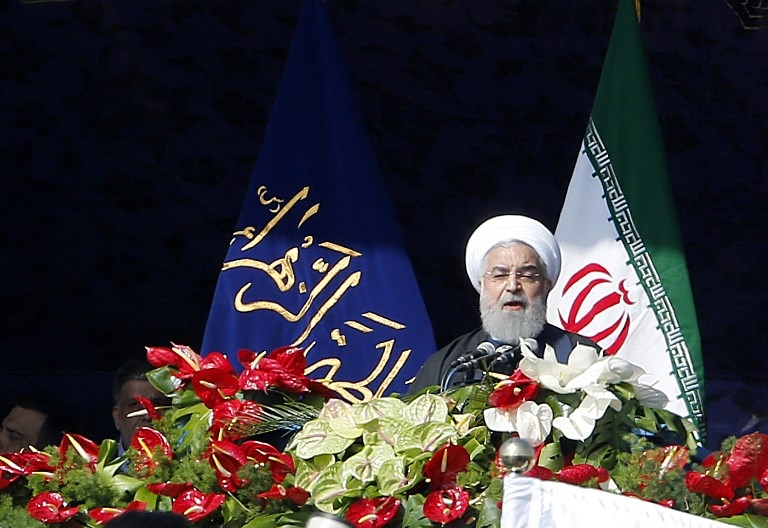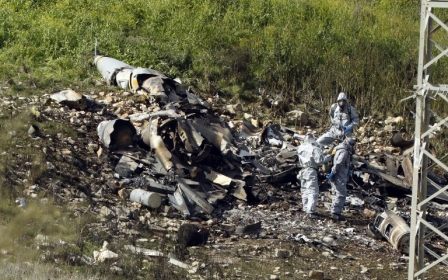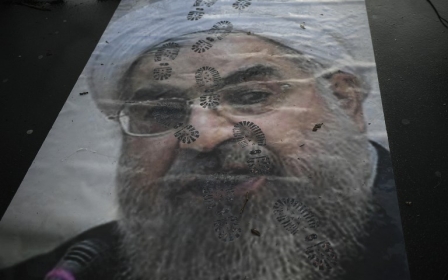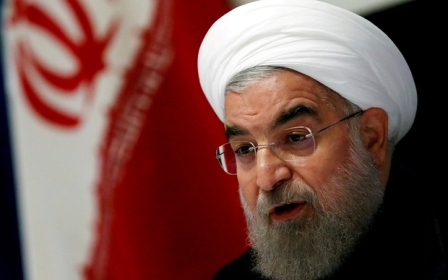Rouhani says US regional policy a failure, as Israel warns over Syria

Hundreds of thousands of Iranians rallied on Sunday to mark the anniversary of Iran's 1979 Islamic revolution, denouncing the United States and Israel as oppressors.
President Hassan Rouhani, addressing flag-waving crowds on central Tehran's Azadi (Freedom) Square, made no specific reference to Israel's air strikes in Syria on Saturday, which it said were aimed at air defence and Iranian targets.
But he told the crowd: "They [US and Israel] wanted to create tension in the region ... they wanted to divide Iraq, Syria ... They wanted to create long-term chaos in Lebanon but ... but with our help their policies failed."
Iran backs Syrian President Bashar al-Assad in the civil war, supports Shia militias in Iraq, Houthi rebels in Yemen and Lebanon's Hezbollah.
US President Donald Trump, who sees Iran as a rising threat to regional stability in the Middle East, has pledged to work with Israel and Iran's key regional rival Saudi Arabia to curb what they say are Tehran’s attempts to extend its influence in the region.
Israel's air strikes on Saturday, which it said successfully hit air defence and Iranian targets, represented the most serious confrontation between Israel and Iranian-backed forces in Syria in the seven-year civil war.
The Syrian army claimed to have brought down an Israeli F-16 after Israel reportedly shot down an Iranian drone it said had entered Israeli airspace. Iran has denied the Israeli claim, saying its presence in Syria is only advisory.
Israel issued stark warnings on Sunday over Iran's presence in Syria.
"We inflicted on Saturday a heavy blow to Iranian and Syrian forces," Prime Minister Benjamin Netanyahu said at the start of Sunday's cabinet meeting.
"We made clear to everyone that our rules of engagement will not change in any way. We will continue to harm anyone who tries to harm us. This was our policy and this will remain our policy."
Long range missile
In a show of defiance of Western pressure to curb its ballistic missile programme, Iran put its Ghadr ballistic missile with a range of 2,000km on display in Tehran's central Vali-ye Asr street.
Iran says its missile programme is solely defensive in nature and is not negotiable as demanded by the United States and the Europeans.
Iranian state television said "tens of millions of people" rallied to support the revolution across the country of 81 million, which faced its worst domestic crisis in nearly a decade in late December.
For over a week, thousands of young and working-class Iranians angry about official corruption, unemployment and a widening gap between 'rich and poor, staged anti-government rallies in 80 cities and towns. Iran’s elite Revolutionary Guards put down the protests.
Iranian authorities said 25 people died and over 3,000 people were arrested during the unrest. Most of those arrested have been released but 'around 300 remain in jail facing charges, according to Iran’s interior ministry.
"America wanted to interfere in our state matters. But they failed because of our nation's awareness and unity," Rouhani said, echoing Iran's claim that the protests were instigated from abroad.
New MEE newsletter: Jerusalem Dispatch
Sign up to get the latest insights and analysis on Israel-Palestine, alongside Turkey Unpacked and other MEE newsletters
Middle East Eye delivers independent and unrivalled coverage and analysis of the Middle East, North Africa and beyond. To learn more about republishing this content and the associated fees, please fill out this form. More about MEE can be found here.




